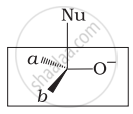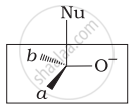Advertisements
Advertisements
प्रश्न
Write balanced chemical equations for action of ammonia on - acetone
उत्तर

APPEARS IN
संबंधित प्रश्न
Acetaldehyde, when treated with which among the following reagents does NOT undergo addition reaction?
(A) Ammonia
(B) Hydroxylamine
(C) Ammoniacal silver nitrate
(D) Semicarbazide
How are the following compounds prepared?
benzaldehyde from benzene
Predict the products of the following reactions:

Predict the product of the following reaction:

What is meant by the following term? Give an example of the reaction in the following case.
Imine
What is meant by the following term? Give an example of the reaction in the following case.
Schiff’s base
Predict the products formed when cyclohexanecarbaldehyde reacts with the following reagents.
Excess ethanol and acid
How will you bring about the following conversion in not more than two steps?
Bromobenzene to 1-Phenylethanol
Give plausible explanation for the following:
Cyclohexanone forms cyanohydrin in good yield but 2, 2, 6 trimethylcyclohexanone does not.
Complete the synthesis by giving missing starting material, reagent or product.
\[\ce{C6H5CHO ->[H2NCONHNH2]}\]
How will you convert sodium acetate to methane?
Write the main product formed when propanal reacts with the following reagents:
2 moles of 3 CH OH in presence of dry HCl
How will you convert benzoic acid to m-bromobenzoic acid?
Which of the following is the correct representation for intermediate of nucleophilic addition reaction to the given carbonyl compound (A):

(i) 
(ii) 
(iii) 
(iv) 
Reaction of aqueous sodium hydroxide on chlorobenzene gives which of the following products?
Grignard reagent on reaction with acetone forms.
Paraldehyde is formed as a result of polymerisation:-
The increasing order of the following compounds towards HCN addition is:
| (i) |  |
| (ii) |  |
| (iii) |  |
| (iv) |  |
Which of the following is most reactive in nucleophilic addition reactions?
Draw structures of the given derivatives.
The ethylene ketal of hexan-3-one
Why dissociation of HCN is suppressed by the addition of HCL?
Draw structure of the following derivative.
The ethylene ketal of hexan-3-one
Draw structures of the following derivative.
The ethylene ketal of hexan-3-one
Draw structure of the following derivative:
Acetaldehydedimethylacetal
Draw structure of the following derivative.
The ethylene ketal of hexan-3-one
Draw structures of the given derivatives.
The ethylene ketal of hexan-3-one
Draw the structure of the given derivative.
The ethylene ketal of hexan-3-one
